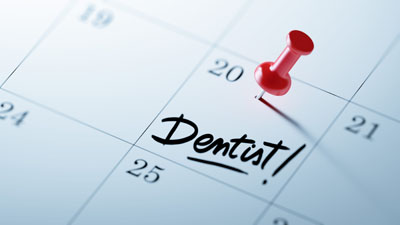How Do I Know If I Have a Cavity?
 v>People may wonder from time to time, "How do I know if I have a cavity?" Tooth decay or cavities are one of the most common oral health problems that a person will face throughout their lifetime. They happen so frequently in children that the Centers for Disease Control and Prevention, CDC, lists cavities as an infectious disease. It is important to know the signs of a cavity and treat them early with a dental appointment. Otherwise, it could spread and cause further damage or infections. Here are some of the indications that there is a problem and it is time to schedule an appointment
v>People may wonder from time to time, "How do I know if I have a cavity?" Tooth decay or cavities are one of the most common oral health problems that a person will face throughout their lifetime. They happen so frequently in children that the Centers for Disease Control and Prevention, CDC, lists cavities as an infectious disease. It is important to know the signs of a cavity and treat them early with a dental appointment. Otherwise, it could spread and cause further damage or infections. Here are some of the indications that there is a problem and it is time to schedule an appointment
Signs of a cavity
#1. A toothache
A toothache is the most obvious sign of . The tooth can begin to hurt when a patient bites down or chews food. In some cases, it may begin to hurt at all times of the day. As the decay spreads and becomes more significant, it is common for the tooth to have a throbbing sensation on a daily basis. This condition typically requires medication such as ibuprofen in order to treat the discomfort.
At this point, it is clear that there is a problem with the tooth and it is necessary to schedule an appointment. If brushing and flossing the area between the teeth takes care of the pain, then it was most likely food or plaque stuck between the teeth. If the tooth continues to hurt, it is likely a cavity.
#2 Sticky feeling
When a tooth is suffering from decay, that area of the tooth will become soft and almost sticky. When biting down, pay attention if the teeth feel like they are sticking together because decay could be causing the issue.
#3. Change in tooth color
If a tooth begins to change color and become gray or even black, it is a sign of decay or even worse, a serious infection. This is an indication that it is time to visit our clinic as quickly as possible. Keep in mind that it is normal for teeth to become stained and yellow over time, so this is not a yellow or dingy color that we are talking about but something that is much darker in nature.
#4. Persistent bad breath
When a patient has bad breath after brushing and flossing, it can even be a sign of a health problem. Just like someone who is suffering from a cold or flu is going to get bad breath, someone who is suffering from decay or a dental infection is also likely to suffer from bad smelling breath. If it continues, visit the dentist to find out if you or infection in the mouth. This also could be a sign of dry mouth or halitosis.
#5. Tooth sensitivity
Patients who have cavities will also suffer from tooth sensitivity. This means that when something too cold or too hot is consumed, the teeth may feel pain. Additionally, those that feel discomfort and pain when eating a dessert or something that is crunchy, may also be suffering from cavities.
Schedule an appointment
To better answer, "How do I know if I have a cavity?", schedule an appointment with our dental office. We can conduct an examination and provide a definitive answer, before recommending a treatment plan.